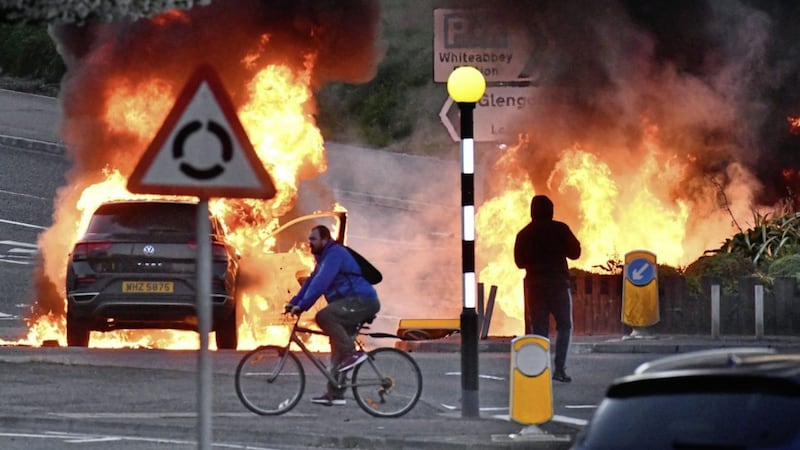Sometimes you can find truth in even the most fanciful stories. It is said that a pilot was disciplined once for a jokey announcement as he flew into Belfast International Airport.
“We are about to land in Belfast,” he said. “Please turn your watches back, the local time is 16.90.”
The clocks have been well and truly turned back this past few months as the DUP – anxious to shift attention from its mishandling of Brexit and its unintentional role as midwife to the Northern Ireland Protocol – has resorted to its old tricks.
The cry of ‘betrayal’ is the DUP equivalent of the ‘Get Out of Jail Free’ card in Monopoly. If they are in a tight corner, they whip up unionist insecurities, give loyalist paramilitaries a longer leash and sit back and watch while the country goes up in flames.
But there’s no ‘get out of jail free’ for the kids who get involved in rioting and mayhem.
What we have been witnessing over this past few months – heightened by the violence of the past week – is a little more complex than the headlines might suggest. This is not just about the constitutional question. In large part it is about criminality – drug dealers and crooks protecting their patch and using children to fight their battles with the police.
It suits some in unionism that, to the outside world, it looks like the opening shots in a loyalist insurrection against the imposition of the protocol, and a new border down the Irish Sea.
But the truth is that criminality has always been the primary purpose of loyalism. The people who have suffered for it are the very people they claim to defend – and their innocent victims from both sides of the political divide.
They trade off the memory of the sons of Ulster who were slaughtered on the Somme, but there was nothing noble or heroic about the defiance of home rule, the gun-running, the threats that partitioned Ireland, or the sectarian assassinations of innocent men and women.
In more recent times, the Ulster Brigade branding has been used to disguise mafia-style criminality which makes the godfathers rich at the expense of others: businesses forced to pay protection money, youngsters turned into drug addicts, people terrorised in their own homes.
One of the things that characterised constitutional nationalism’s response to the troubles was its implacable opposition to the use of violence for political ends. John Hume articulated that opposition, day in and day out, atrocity after atrocity. But he was not the only one. The pope travelled to Ireland and said: “On my knees I beg you to turn away from the paths of violence and return to the ways of peace.”
The same cannot be said for unionism which has yet to face up to its use of violence to sustain the sectarian state whose centenary we have been asked to celebrate this year.
Maybe I am being unreasonable in expecting to see a unionist leader challenge loyalism rather than kow-tow to it. Perhaps the lack of a visionary leader is a sign of how deep the fear of the loyalist kraken runs. But until that figure emerges, the sons and daughters of Ulster will continue to suffer economically and politically.
If you step back, and take a hard look at the history of this place, it cannot be argued that unionism has delivered – for its own people, never mind the rest of us.
Wedded to the myth of a kingdom which might be united in name, but is not united in reality, unionist leaders have surrendered the long-term political, social and economic stability of this part of Ireland.
Their connivance led to the hardest of hard Brexits, and gifted the premiership to Boris Johnson – a man whose chumocracy has gifted billions of pounds of public money to Tory donors throughout the Covid crisis, and who has turned his back on the needs of Northern Ireland and the peace process.
Such is the contempt Johnson has for Northern Ireland that he has gifted it with Brandon Lewis as secretary of state; and he has placed a border down the Irish Sea while denying such a thing exists.
It is long past the time when Arlene Foster, Steve Aiken and Jim Allister and their colleagues woke up to the fact that while Boris fiddles, Northern Ireland burns.








